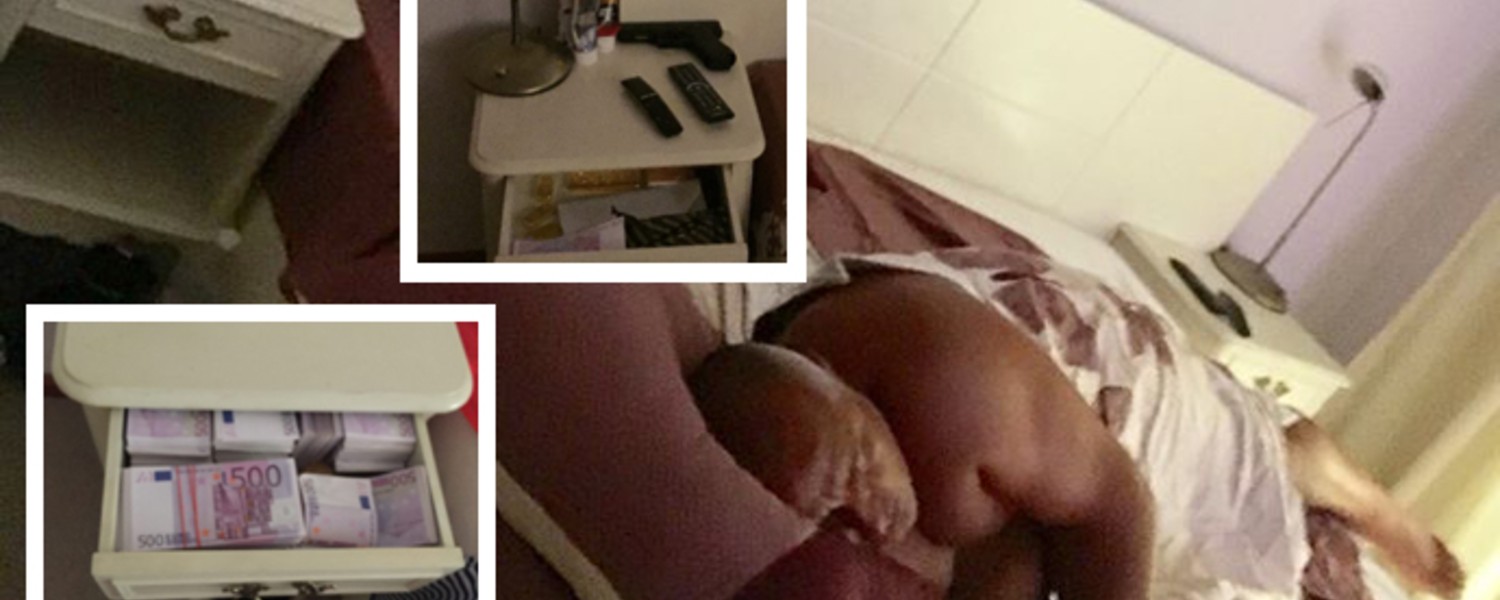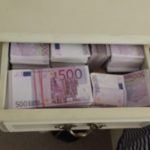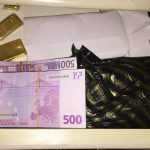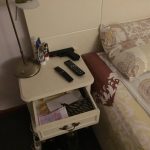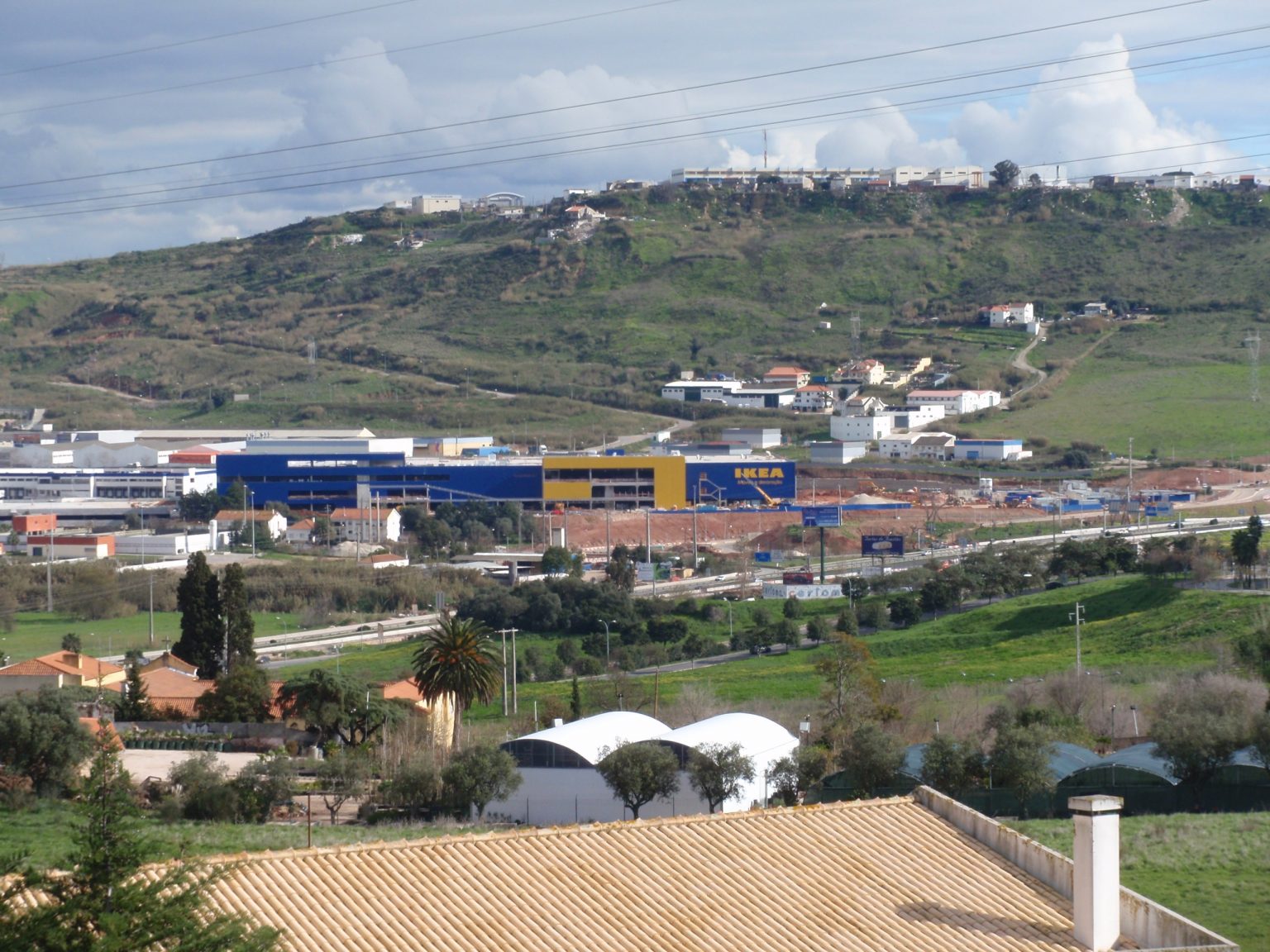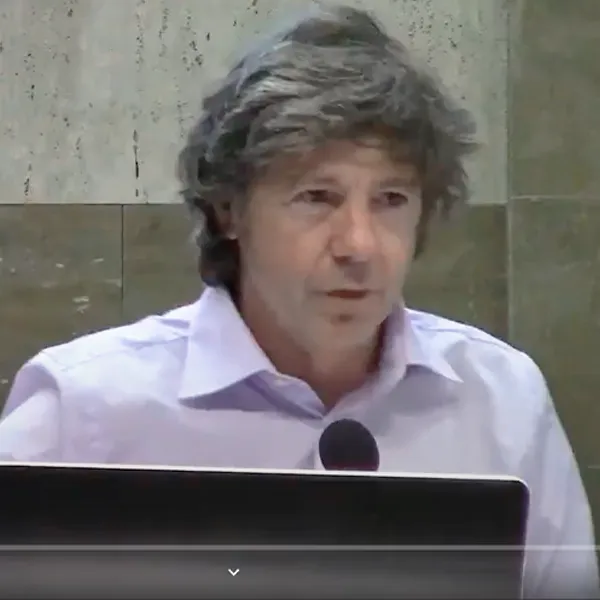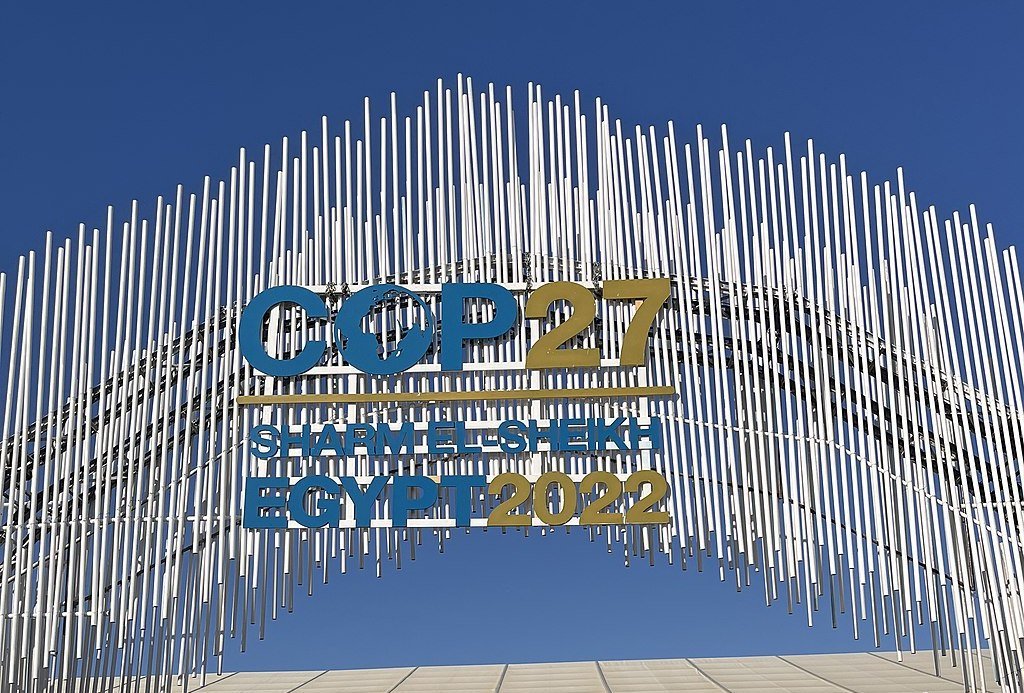Where is Bulgaria 30 years into capitalist restoration? Pretty much at the end of its statehood. The society and culture in deep decline, the economy virtually controlled by oligarchic structures and institutions that are only there in order to not do their job.
It is not surprising that people are on the streets, is it? While the European Union is obsessed with Belarus, a country outside its structures, at its southeastern frontier a disastrous civilizational downgrade has been happening and is now coming to a head again. Yet nobody cares. An authoritarian mobster is running the government, the police are beating up people on the streets, there is virtually no opposition media and society is drowning in misery. But it is OK. Not a word from Brussels, Berlin or Paris. Despite three consecutive months of daily protests.
Spontaneity and vague demands
You may have heard about it — Bulgaria has been the country with the greatest poverty and the least equality in the European Union since it was accepted as a member. Another piece of news you might have encountered — people there are out on the streets.
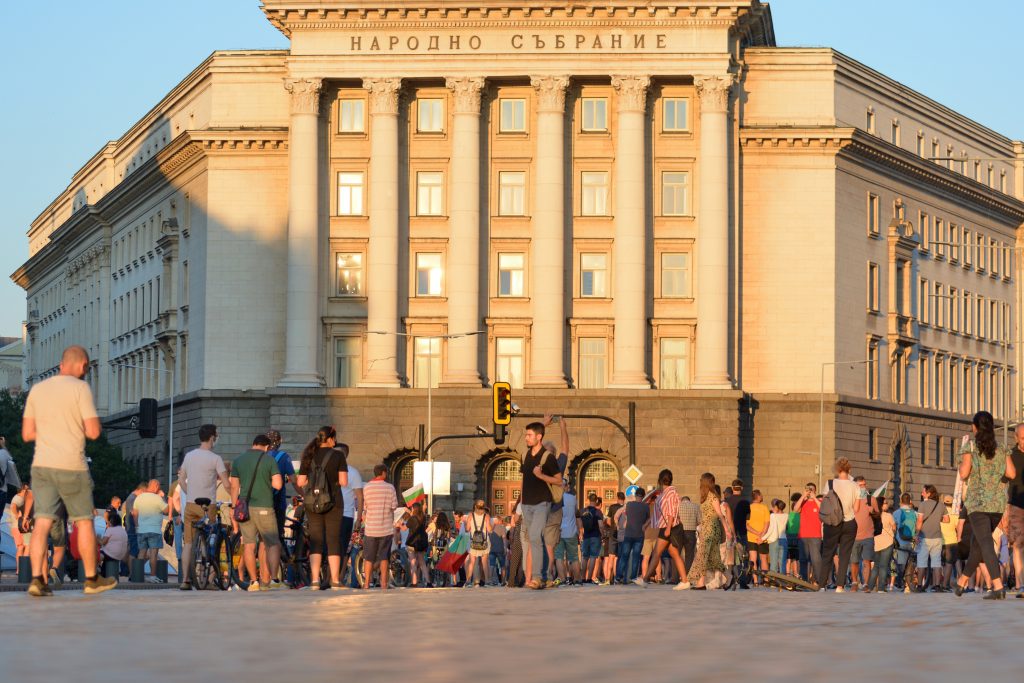
Throughout the summer Bulgarians, regardless of their party affiliations or specific political views, have been protesting in the capital city of Sofia and other urban centres. Thousands of the millions of Bulgarians who have emigrated in recent decades are also protesting in the UK, USA, Germany and other countries. It will soon be three months — 90 consecutive days and nights of active street protests without a break.
There are a number of severe economic and social problems in Bulgaria. This is obvious. One quick look at Eurostat’s webpage and you will find thousands of reasons for the ongoing protests. Yet it is not so easy to actually grasp a set of postulates that would refer exactly to those issues. Strange as it may be, though the stats are appalling, the demonstrators have made hardly any strictly social demands so far. They have mostly been driven by the sense — an absolutely justified and correct one — of a declining state controlled by an oligarchy, a complete lack of justice, a corrupt judiciary and politicians dependent on crony deals. Although attended by all sorts of people, the main core of the anti-government protesters are middle-class people. Poor as they might be by European standards, by Bulgarian ones they are those in a slightly better financial situation, who can simply no longer tolerate the burden of hyper-corruption in Bulgaria.
Two events that were immediate and direct triggers of the protests can be identified, though. Two almost simultaneous occurrences unleashed this unexpected wave of discontent, and instead of just posting on social media, people moved onto the streets.
The boat, the beach and the National Security Service
Hristo Ivanov is the leader of a small right-wing liberal party, Yes Bulgaria, in opposition to the current government. Two months ago he put on a kind of political performance. On a public beach by the Black Sea, apparently seized by another politician, one Ahmed Dogan. The latter is an honorary chairman of the Movement for Rights and Freedoms party (DPS), is widely considered a personification of the oligarchy and is viewed by many as a behind-the-scenes partner-in-crime to the Prime Minister, Boyko Borisov.
Hristo Ivanov’s attempt to access the beach next to Ahmed Dogan’s palace.
Right next to his palace-like residence there is a beach which, according to all the documentation, is public property. However, it was closed to ordinary people from all possible land routes. Ivanov, who is a former justice minister in one of Borisov’s previous cabinets and resigned after disagreements over judicial reforms, arrived at the beach in question with a couple of activists in a dinghy. They were immediately confronted by security guards and were pushed back into the water. Ivanov’s claims that these men, who behaved violently and refused to identify themselves, were employees of the National Security Service (NSO) — the service that is supposed to guard the country’s leading political figures such as the Prime Minister, President and Speaker of the parliament — were later confirmed.
It turned out that for years, for reasons unclear to the public and without any legal basis, the NSO has been guarding Dogan, even though he is officially out of politics.
Attorney General or mafia executioner?
At the same time, something else happened — the country’s Attorney General by the name of Ivan Geshev, whose resignation is also demanded by the protesters, along with that of the Prime Minister, carried out an unprecedented assault on the office of the President of the republic, Roumen Radev, who is Boyko Borisov’s only serious political opponent. It is Radev who has managed to inflict the only significant electoral loss on Borisov’s party (Citizens for European Development of Bulgaria, GERB), in the 15 years of its existence, by winning the presidential race in 2016.
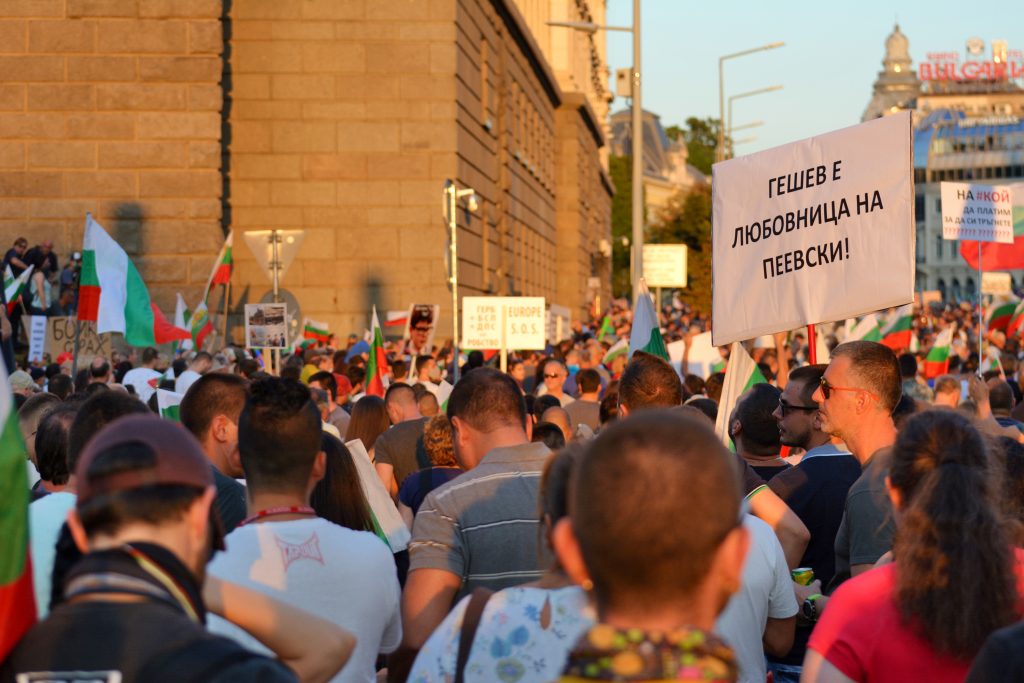
Geshev is also considered to be close to the DPS and to the strongest man in that party — the infamous Delyan Pehevski. He is an MP, a media mogul and one of the country’s richest and most powerful oligarchs. Geshev and Radev have been in conflict since the President initially tried to block Geshev’s appointment as the head of general prosecution.
The assault on the presidency was directed against top-ranking officials from Radev’s administration who have been accused of corruption. The charges are rather bogus — someone sent an SMS potentially requesting support in a business deal and the official in question replied something along the lines of “We’ll see about it”. Yet the raid was extremely ostentatious; a dozen armoured cars, militarized policemen with full weaponry, etc.
This led to an immediate escalation of the conflict, which also involved an official inquiry by Ivan Geshev to the Constitutional Court regarding the President’s immunity. It all quickly evolved into an absurd war of institutions, with those led by the mafia and the government on the one side, and the President on the other.
This appeared to be the straw that broke the camel’s back.
The protest begins
On the 9th July large crowds started gathering on the square in front of the presidential office in the centre of Sofia, demonstrating their support for the only institutional voice raised against the violent oligarchic rampage orchestrated by the government and the Attorney General.
Radev is a figure widely considered to be the closest to what one would call an honest politician. Even by those who would oppose him in terms of a political agenda. He is, justifiably, perceived as a staunch enemy of the oligarchic cabal behind Borisov. So now, when the excesses of the oligarchic clique at the top have become unbearable, quite naturally, people gather around him as the central opposition figure.
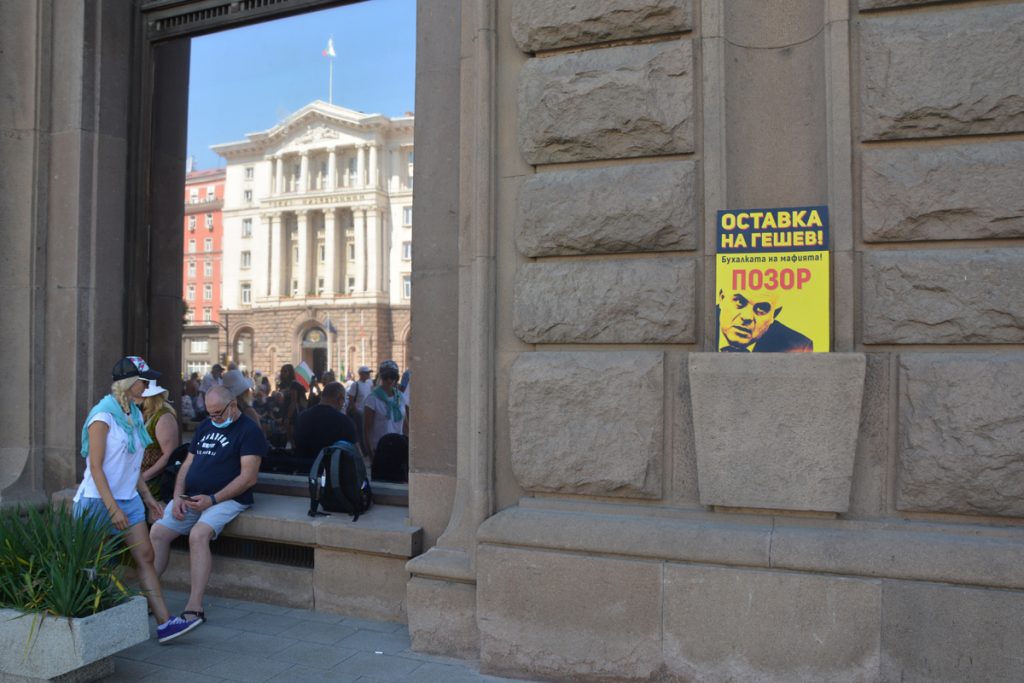
So, the statistics are one thing; the poverty and the general social decline are obviously a reason to take to the streets en masse. Yet, these pathetic genre scenes from a state so obviously privatized by the mafia — it was like rubbing salt into an open wound. The people could no longer tolerate the corruption, the impudence and the vulgar hooliganism. Yes, this time it was really vulgar, by the way.
The immediate display of this vulgarity has a history. At the beginning of June some spicy recordings were leaked to the media, in which a person whose voice strongly resembles that of Boyko Borisov is heard speaking. The audio is full of primitive and vulgar language, insults randomly thrown at political opponents, really ugly remarks and “jokes” about European leaders as well as descriptions of a whole number of abuses of power by Borisov.
These recordings were never investigated by Attorney General Ivan Geshev. Or, to be more precise, the National Prosecution did investigate them, but not what was said; they made a case regarding “illegal recording”. Geshev’s actions were a show of negligence displayed in a very cocky and demonstrative manner.
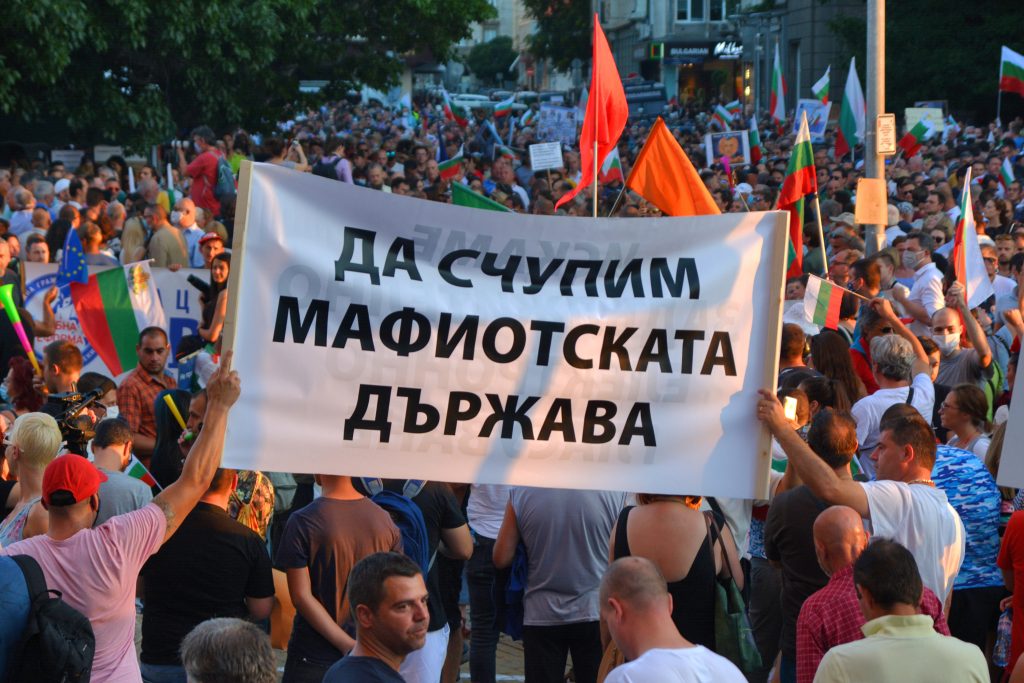
“When you’re dumb — it’s easy!”
The first leak was sent to several media outlets on June 12th. The audio is a little over six minutes long. A voice sounding very much like that of Boyko Borisov can clearly be heard. The context also points towards the Bulgarian PM. Apparently he was having a conversation, probably on the phone, with another person whose identity and even voice were not revealed.
Borisov describes the Speaker of the National Assembly, Tsveta Karayancheva, who is a representative of his party as “a stupid c**t from Kardzhali”. Borisov was apparently explaning how Karayancheva should justify her controversial approach to the genocide of the Armenians carried out by the Turks in the 19th century.
“Just make Tsveta say: I’m just a stupid c**t from Kardzhali and I can’t tell the difference between mass extermination and genocide. Comply with my stupidity.“
After that there is a long monologue about how Borisov himself was lying to European politicians, including prime ministers of other countries, about his own ignorance and the sort of actions he had undertaken as a result of his stupidity displayed on a European level.
“When you’re dumb — it’s easy! Today I had to explain it three times to one of them [European politicians — ed.] because I don’t understand English I didn’t get what he was saying, so they f*****g got it from me, I f****d them real hard, you know. They got it from me, these foreigners, prime ministers… And when they figured out I actually f****d them, they started phoning me up, asking why and so on. And I have to tell them that it’s all been done for the best. I’m dumb. My English is bad. Actually, I thought that’s what they want, f**k it. But now it’s all up the a** and that’s where it stays. And spins!”
“Spread the word in the media!”
Another similar case is described in a similar manner in a similar conversation. According to the speaker, the dialogue was with “Vladi Goranov, Sotir and Geshev”. Most likely the finance minister Vladislav Goranov, the Attorney General at the time — Sotir Tsatsarov, and his deputy and future successor — Ivan Geshev.
“I had the same case this morning. Vladi Goranov, Sotir, Geshev were with me, and they laughed quietly there, and I was so happy to explain to my German colleague, a Bavarian, on the phone, that everything had happened as a result of my stupidity. And then, after a while, to a Hungarian colleague and a Polish colleague. Finally, Geshev shouts: Well, I like to pretend to be crazy, but you, Mr. Prime Minister, you seem to be doing it perfectly well. No, I tell him, Brother — I’m dumb and it’s easy for me. It’s hard when you are smart. So, tell Tsveta Karayancheva to explain everything with her stupidity,” Borisov insists.
However, the vulgarity and the primitiveness, which is extremely difficult to convey in its full spectrum in a translation, is not actually the biggest problem in this recording. In it, the speaker further admits that he personally sent a supposedly independent regulatory body to a private company to hit its owner, who “does not obey” Borisov.
“Spread the word in the media that I have sent the Financial Supervision Commission to Eurohold only to smear his face, because he does not obey! This is very important”.
Borisov was obviously aware in advance of the actions of the Prosecution against the deputy minister, which had not yet been announced publicly. It is about the former Deputy Minister of the Economy Alexander Manolev, who was later accused of misusing European funds.
“Manolev is busted. He will be charged today or tomorrow and will be ruined. I warned him. And the local mayor will burn as well,” we hear in the audio.
It also became clear that Borisov was trying to stage an intrigue and make up a fake scandal involving Elena Yoncheva, at that time an opposition MP and MEP candidate, along the lines of the one involving Manolev. He had built a small hotel with European money. However, instead of using it for touristic purposes it became Manolev’s mansion; a typical fraud mechanism used by Bulgarian politicians.
“So, I will bust them all. And you think Elena Yoncheva will not burn? They will hang them both, the guest houses of both of them will go together. I have sent the police, and if it turns out that there were no guests there as in Manolev’s case…”
Later, Alexander Manolev was indeed charged, but the prosecution never found evidence of any wrongdoing on the part of Elena Yoncheva and her family.
Drones, cash, gold, videos and a “beautiful lady”
Borisov calls the leaked audios a “deep fake.” He also claims that the allegedly fake recordings were put together using his public statements during various media appearances. It remains rather unclear in which of his interviews Borisov used all the vulgarities heard in the leaks.
After a short while Borisov decided to change his strategy from a defensive one to attack. And he did indeed launch one — in his usual provincial and primitive manner. He accused Roumen Radev, the sitting president of the republic, whose residence is located in the same neighbourhood as his own, of “stalking him with a drone that cruises around the house, in front of the windows, but the NSO refuses to shoot it down, even though he may carry explosives.” Radev laughed these accusations off and, although he admitted that he owned a drone, he commented that Borisov’s statements are beyond any serious political discussion.
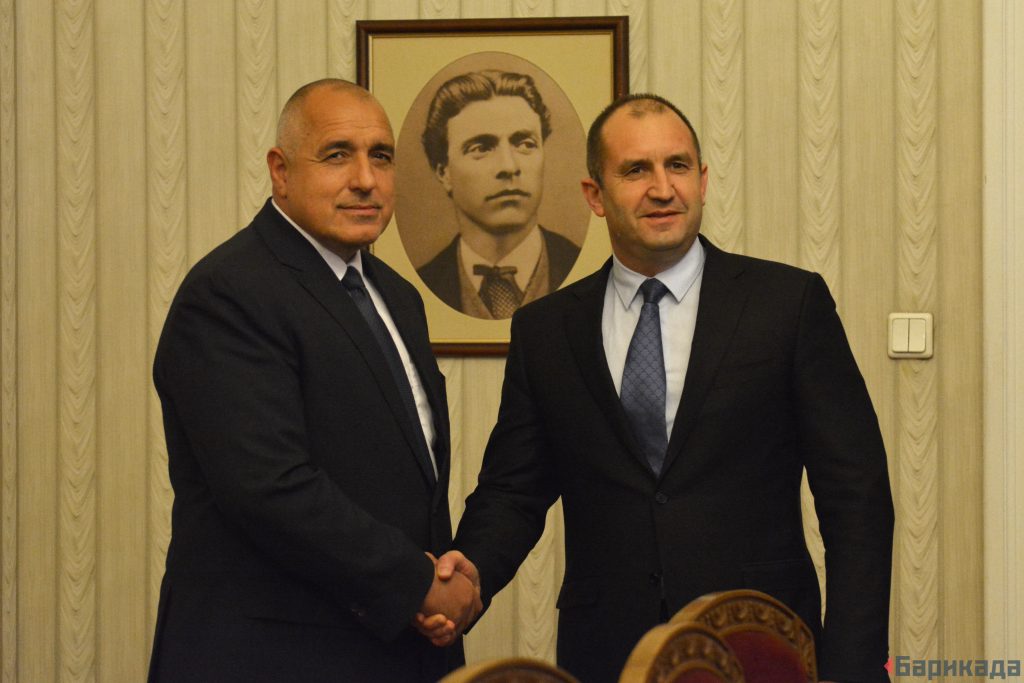
The second series of revelations surfaced five days later, on June 17th. This time, photos from Boyko Borisov’s bedroom at his residence were sent out to the media. The scandalizing element in the pictures was a bedside table with a drawer located right next to the bed Borisov was sleeping in, with a pistol on top of it, and large sums of cash in bundles of 500 euro banknotes and gold bars in the drawer.
One cannot but be totally aghast at the grotesquely cheap atmosphere which, rather than being the inspiration for D-level detective stories, is hugely symbolic of the state of affairs in Bulgaria in 2020.
As already mentioned, on the bed next to the bedside table a sleeping person is seen, again a striking similarity to Boyko Borisov has to be noted. Apparently the photos were not taken on the same day, as the amounts of money differ.
Borisov admits that only the picture showing him asleep is real and claims that the other photos, where the money and the pistol are displayed, are fake. A video from Borisov’s home was later published, and a reflection in one of the mirrors makes it clear that the author of the video was a woman. Surprisingly or not, Borisov explained that this “beautiful lady” was “sent” by people close to President Roumen Radev.
Curiously, none of these allegations have been investigated at all so far by Attorney General Ivan Geshev. It is obvious that Borisov knows who was in his apartment and photographed him while he slept, and perhaps, according to him, set up a huge scam to disgrace him (the money and the gold in the locker). For the time being, it is not in the interest of the prosecutor’s office to prove whether this is really the case.
This refusal of the prosecutor’s office to investigate a situation where the Prime Minister of Bulgaria is photographed sleeping next to a drawer full of cash, gold and a gun speaks for itself. This is Bulgaria today. In one picture, or rather in a couple of pictures and a short video clip.
“Unpleasant” Lukoil funding, “Make me a real statesman” and “This must be heard on the evening news”
Episode № 3 of the saga came out on June 27th, when two new recordings were released. They last for a total of about five minutes, and the first of them is said to be a conversation with the businessman and former director of Lukoil Bulgaria, Valentin Zlatev. This recording is marked as “Valentin Zlatev call” and ends with a call for Zlatev and the speaker to meet up and talk, as the topic of conversation is whether Zlatev is helping the opposition Bulgarian Socialist Party’s leader Cornelia Ninova and Rumen Radev.
“These two [Ninova and Radev — ed.], you know, everyone says that you are their main thunder. It’s not pleasant at all, my friend. If you want to, let’s meet up tomorrow night,” the speaker was recorded saying.
In the next recording, the main topic is also President Radev, who, according to the speaker, should be ridiculed and mocked, and “this must be heard on the evening news.” It becomes clear from the context that Borisov is ordering one of his ministers to make the media portray him as a serious politician and, speaking about the minister in question who was to participate in an economic forum together with Radev, “to make him look good”. And this is because a day earlier, the President had officially announced that he was losing his political faith in the cabinet after consistent criticism of the corruption in the government.
“The cameras had to record you! Go to the parliament and tell them something about the forum! Tell them. Tell them that despite yesterday’s tone and his [Radev’s — ed.] nonsense [the announcement regarding loss of confidence — ed.], I sent you there as a true statesman, to attract investors. I was the wiser again! That’s what I want to hear on the evening news! I’m going to have dinner with Ursula [von der Leyen — ed.] now. We have to make fun of him, make him look ridiculous!” the speaker insisted.
On July 15th, a new leak appeared, from which it became clear that Boyko Borisov had extremely good relations with the President of the Constitutional Court — the former Attorney General, Boris Velchev. Borisov addresses him with a very peculiar variation of the word “brother” — bratinhyo. It is very symbolic as this word became popular during the early 90s when the mafia structures were established, and it is a product of this particular culture. It denotes a specific kind of friendship approaching the kind of family terms that we know from mafia movies. It seems as if the people who sent this recording to the media aim to show the relationship between Borisov and the chairman of the country’s highest constitutional body.
The last recording leaked so far, surfaced on July 29th. In terms of vulgar language it certainly does compete with the very first one, but the object this time is President. Radev. The President, a former general, a military pilot awarded multiple times and former chief of staff of the Bulgarian Air Force, is called an “ordinary pilot” by a man whose voice, again, seems to be the PM’s. This time, according to his anonymous senders, the conversation is with Deputy Prime Minister Tomislav Donchev. The topic of conversation is changes in the tax laws regarding old cars, as Borisov is angry that Radev also opposed him on this point.
“Is it right? It’s right. If there are reasonable people and they will say Bravo! In Finland, cars are banned in Helsinki from next year. Only electric public transport. (…) He was a pilot… We have thousands of pilots! The one who carries two hundred and fifty passengers on the plane is a hundred times more a pilot, in civil aviation, than him! Motherf*****s! They will pay 10 leva more [five euros — ed.] and he is announcing that I am raising taxes! The President tells you that! A president in quotes, because he can’t be the head of state, this idiot! When the President tells you that, you don’t argue with me, you argue with two and a half million who have recognized that he is their protector. Why do we let him do it?! F**k his mother’s c**t!” we hear Borisov saying furiously.
“Call the Customs and the police off! Right now!”
In fact, the recordings published in 2020 are not the first with, presumably, the Bulgarian Prime Minister as the central figure. In 2011 a recording was sent to the media of a conversation between Boyko Borisov and the head of the National Customs Agency, Vanyo Tanov. The recording shows Borisov ordering Tanov to suspend the investigation and an ongoing police raid against businessman Mihail Mihov, better known by his nickname, Misho “The Beer” (he owned a brewery).
“This Misho, you know, The Beer, he called me again now. And there are these… What are they? Customs officers? Or are they the police? They are taking action (…) Come on, call the Customs and the police off! Right now! We made a commitment not to! (…) Make your call and take them all out of there and we’ll talk when we meet up. If you have to, call him now and tell him what we have agreed upon! Because I made a promise. Since I promised him that I wouldn’t bother him — I shall not,” says Borisov.
Initially, pretty much like now, he claimed it was not a genuine recording but an edited one. The leak and its content were a subject of investigation for many years, to no avail. Years later, Borisov actually admitted that the recording was genuine, but explained that he was actually the good guy there, as in this case he had prevented the blackmailing of a businessman through inspections.
On second thoughts — to no avail? Really? Well, both of the people involved in this conversation are now dead.
The other recording was published back in 2013. The Prime Minister’s voice is registered, and those of the then agriculture minister Miroslav Naydenov, and Sofia’s prosecutor Nikolay Kokinov are also heard. We hear Borisov speaking on the phone with the second-in-command in GERB — Tsvetan Tsvetanov. Kokinov addresses Borisov and discusses the then recently elected new Attorney General, Sotir Tsatsarov: “Don’t laugh, you chose him!”
In the conversation, the three vulgarly discuss journalists from leading media, comment on their sexual orientation, mention several other people and generally discuss public life in the country in a way that resembles a scene from a cheap Italian mafia movie.
Borisov did not comment on the recordings, arguing that they were illegal. And Tsatsarov said years ago that he did not feel he was “Borisov’s personal prosecutor” and did not find any crime to investigate in this conversation.
Conclusion: the EU will probably wag a finger
On October 5th, 2020, the European Parliament will hold a debate on the rule of law in Bulgaria, provoked by the attempts of several Bulgarian MEPs to put the Bulgarian protests and the reasons for them on the agenda of the Union. Some of the things heard in the recordings are expected to be commented on in Brussels. Such attention from the outside to the appalling features of the country’s political reality and specifically to the person of Prime Minister Borisov is certainly desired by the protesters and by all of Borisov’s opponents. But the hope that he will be overthrown in this way has long been low. After all, everything that is heard in the recordings has long been known to Borisov’s European friends. And we know how his European partners think — he may be a son of a bitch, but he is our son of a bitch.
And this seems to be the heart of the problem. It beggars belief that the EU would actually undertake any substantial action. For over a decade now the presence of Bulgaria in the “European community” has been the proof that its accession was nothing more than yet another nail in the coffin — the coffin that was designed in 1989. The funds Brussels supplies to Bulgaria have been the object of rampant theft almost from the very beginning, since the moment the oligarchy figured out they could do it with impunity. And even those funds that are legally distributed fall into a highly corrupt network. It is estimated that over 80 per cent of the subsidies for agriculture in Bulgaria are consumed by less than 10 families. The money poured into the Bulgarian economy through this channel is nothing more than pocket change on top of the fortunes of a handful of people, built through organized robbery of the wealth worked for by the socialist republic until the late 80s. It is ironic that after three decades of theft there still is something out there to be stolen.
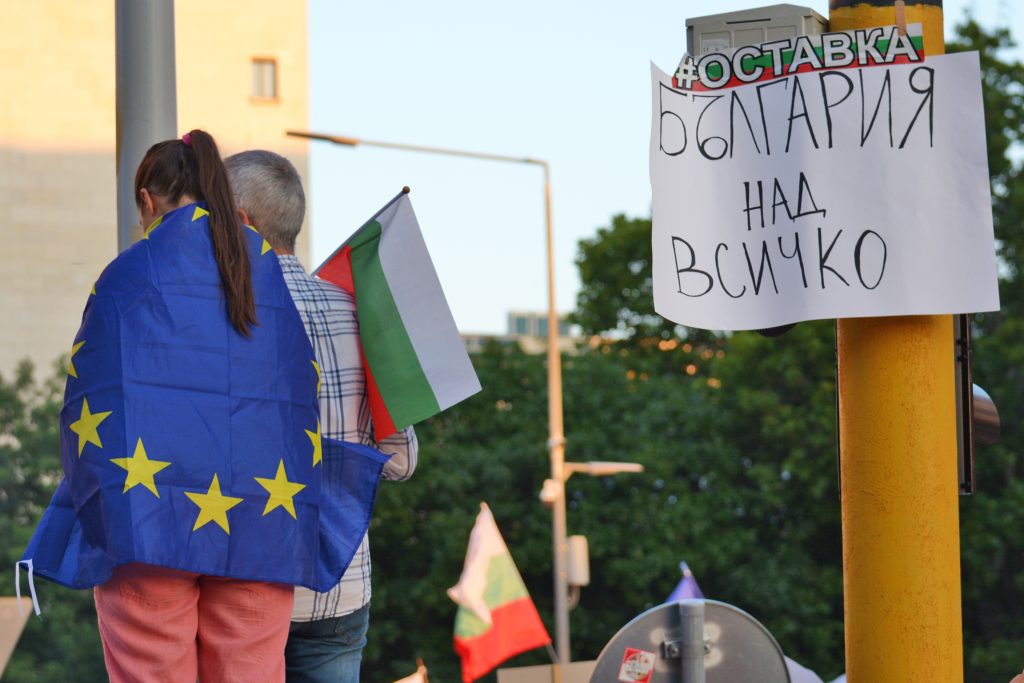
What Borisov’s value is to Merkel, Juncker or Verhofstadt remains their exclusive knowledge. Yet we do know the price we have paid for their arrangements with one of the top ranking mobsters not only in Bulgaria but in the entire region. What geopolitical purpose it serves and who benefits from the civilizational disaster that the nation has been enduring since 1989 is an open question. Again, what is certain is that Bulgaria today is a failed state with all the indications of terminal social and economic implosion; it is the new Third World alongside Ukraine, Moldova and some of the Baltic states. Anything really could push the situation over the brink; any major accident could make the modern Bulgarian statehood cease to exist. The current pandemic has actually almost done that.
We also know that whatever happens on October 5th, nothing or close to nothing will change on the ground in Bulgaria. We have seen the (non)actions of the European institutions in regard to Hungary and Poland. While a hue-and-cry festival is staged in Brussels the decay will continue. The gangster oligarchy will continue to exploit whatever and whoever is still in Bulgaria. Three million people have departed over the last three decades to look for a better life abroad. Bulgaria has lost one third of its population without being in any war. This ongoing catastrophe has no precedent in Bulgarian history and Borisov is a powerful symbol of the current times as well as the fact that the mafia straightjacket that he holds the entire society in is tolerated and even strengthened by the EU. So much for European solidarity. Or actually, there is solidarity, just not among the peoples of the continent, but in the various capital groups that have no problem welcoming retrograde louts and gangsters into their ranks as long as they can secure them some advantage.
And last but not least, it is not only the European Union which is obviously interested in putting the Bulgarian Prime Minister under its control. Those who set up Borisov’s honey trap with someone who photographed and recorded him with the gold and the cash and took a walk around his mansion certainly had huge backing, obviously from abroad. Had it been a local escort woman trying to extort him, she would have been killed a thousand times, chopped up, dissolved and recycled to the point where any traces of her DNA would vanish; most likely along with anybody who she had ever come across at any moment in their lives.
The mass movement remains our only hope.
The Barricade is an independent platform, which is supported financially by its readers. Become one of them! If you have enjoyed reading this article, support The Barricade’s existence! We need you! See how you can help – here!








